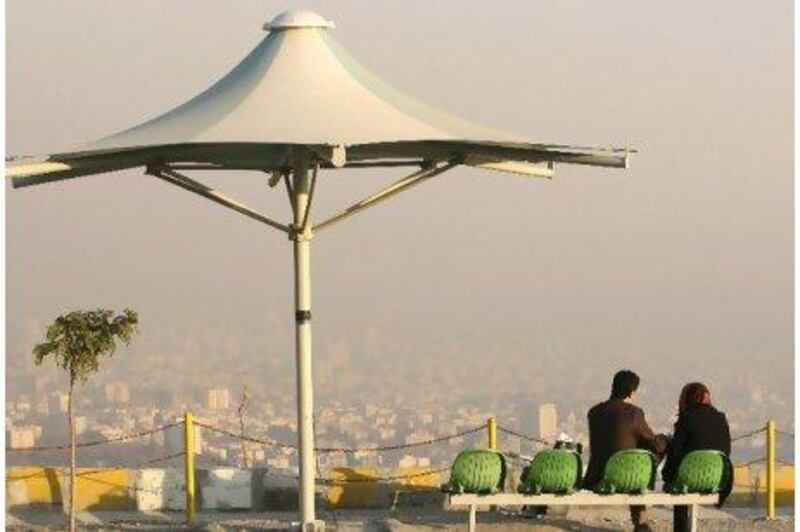TEHRAN // "Smog holidays" and other initiatives in Tehran have not helped much to curb an air-pollution crisis that has sent hundreds of residents to hospital in recent weeks.
Emergency hospital admissions for people with respiratory problems have increased by 19 per cent, the health minister, Marzieh Vahid Dastjerdi, said last week.
The government all but closed the capital on Wednesday and Thursday by declaring impromptu holidays for public sector workers.
The city needs a substantial rainstorm to clear the air, and one cleric is encouraging people to avoid sin and pray for rain. He contends that sin can drive rain away.
With subsidised petrol costing about Dh1.28 a gallon, congestion is almost the only incentive Iranians have to leave their vehicles at home.
The city's roads are full of rickety cars with outdated emissions systems. Tehran is congested with at least three million cars.
Tehran's geography contributes to its pollution. Mountains tower over the capital. They are hardly visible through the pollution during certain weather patterns that trap the smog in the basin.
The government has tried to ease the pollution and traffic congestion in the city by imposing regulations that allow vehicles into central Tehran on alternate days based on whether their licence plates end in an even number or a odd number. Nonetheless, the pollution problem has only worsened year after year.
Ali Bastami, a 32-year-old artist, said: "Traffic limitations don't work so well because I know of many people who keep two cars, one with an odd plate number and another with an even one, so they can always use their own cars
"And projects like creating wind corridors to suck away the pollution sound too impractical if not ridiculous," he said. "The only realistic solution that remains is improvement of public transportation."
The capital has a large public transportation system but it needs to be upgraded and expanded. Mohsen Hashemi, the manager of the Tehran Metro, says it risks becoming overloaded if it is not upgraded soon.
Parliament has voted to finance an extension of existing lines, complete two new ones, and extend the network. But the work is being delayed in what appears to be a political power struggle over the money.
A planned cut in gasoline subsidies, meanwhile, will push up production costs dramatically in the coming weeks or months. That is expected to push more people onto the subway, which is already used by two million people a day.
The protests of the mayor, Mohammad-Baqer Qalibaf, have so far failed to persuade the government to release US$1 billion approved by parliament to improve the subway. President Mahmoud Ahmadinejad has threatened to put the subway under central government control.
The reformist legislator Mohmmad Reza Tabesh told Arman newspaper last week: "The criticism of the government for why it has failed to comply with the law is well-grounded."
Some of Mr Ahmadinejad's critics say he has been reluctant, or even unwilling, to help Tehran, a stance they attribute to political rivalries.
Both Mr Qalibaf and Mr Hashemi are rivals of the president. Mr Qalibaf, a former commander of the Islamic Revolutionary Guards Corps, became mayor after losing the 2005 presidential election to Mr Ahmadinejad. Many Iranians see the mayor as a possible contender for the presidency in 2013.
Mr Hashemi is no mere civil servant. His father is Ali Akbar Hashemi Rafsanjani, a former president who was also defeated by Mr Ahmadinejad in 2005 and who remains an important political powerbroker. He is a staunch critic of Mr Ahmadinejad.
Since the reformist camp was all but silenced by the post-election crackdown last year, it is conservatives within the establishment who pose the biggest domestic threat to Mr Ahmadinejad.
One politician, Amin Shabani, said after Mr Ahmadinejad threatened to take control of the subway: "The presidential election and political rivalries have now come to an end. We should not continue to sacrifice the people for the sake of political issues."
Meanwhile, more than 10 million people live in a space that has the "environmental capacity" for three million, said Mohammad-Hadj Heidarzadeh, a consultant to the municipality. The city, he said, has room for only about 700,000 cars.
The delay in development of public transportation exposes the residents, particularly the elderly, children, and people with cardiac and respiratory conditions, to health hazards, critics say.
Hundreds of people whose cardiac and respiratory conditions were aggravated by the pollution have been rushed to emergency rooms since air pollution reached an alarming level more than three weeks ago, according to officials.
Mahin Farahmand, a 72-year-old resident of the capital, said: "I have been confined to my home for more than two weeks now for the fear of getting ill, and my neighbour had to be rushed to the hospital in the middle of the night when she found it too hard to breathe."
She said her neighbour had been out for a only couple of hours to go to the bank and had worn a mask.
Air pollution hurts the economy, too. Each "smog holiday" costs $350 million in financial losses to Tehran alone, said Mr Tabesh, who is also chairman of the parliament's environment committee.
The World Bank in 2005 estimated an annual loss of US$15 billion to the Iranian economy from air pollution.
* With additional reporting by Reuters





